Nurses Narratives - Staff Nurse Margaret Elizabeth Jones
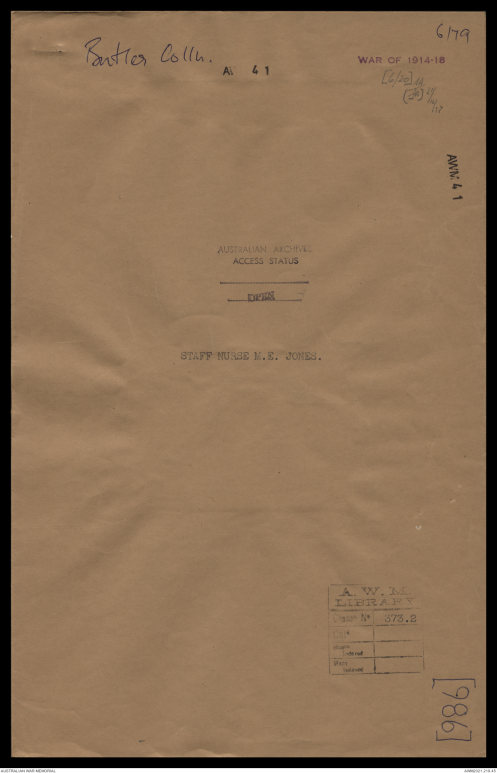
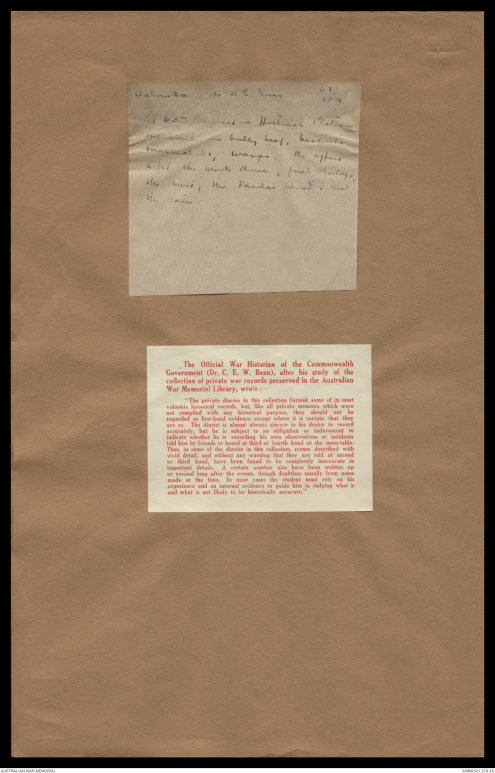
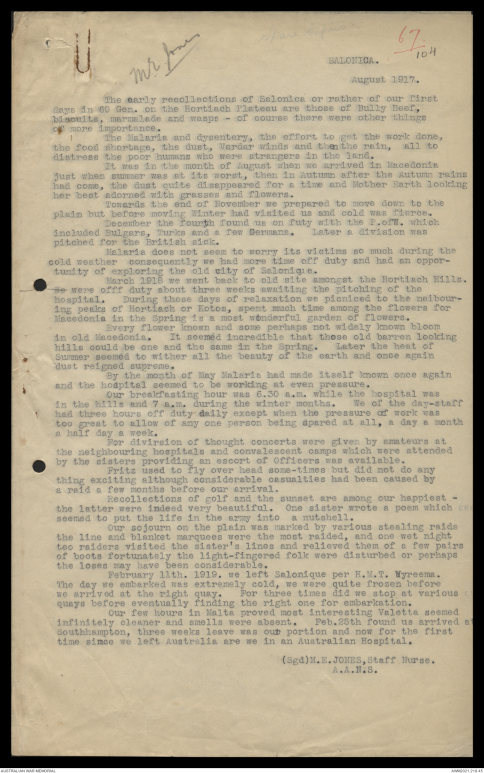
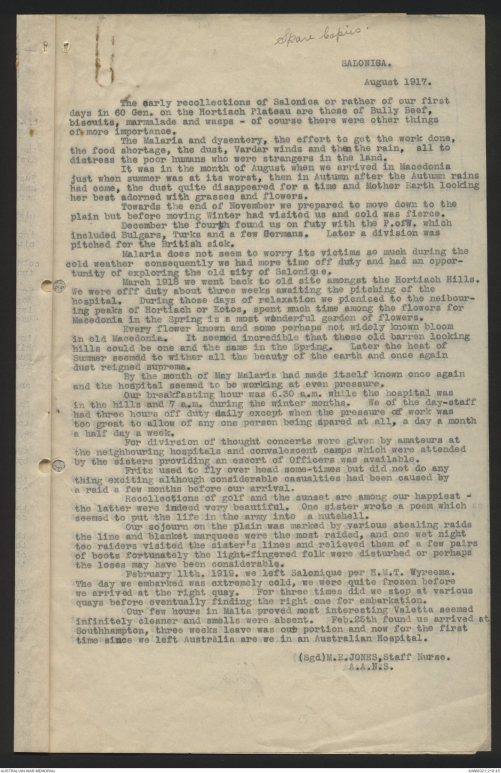
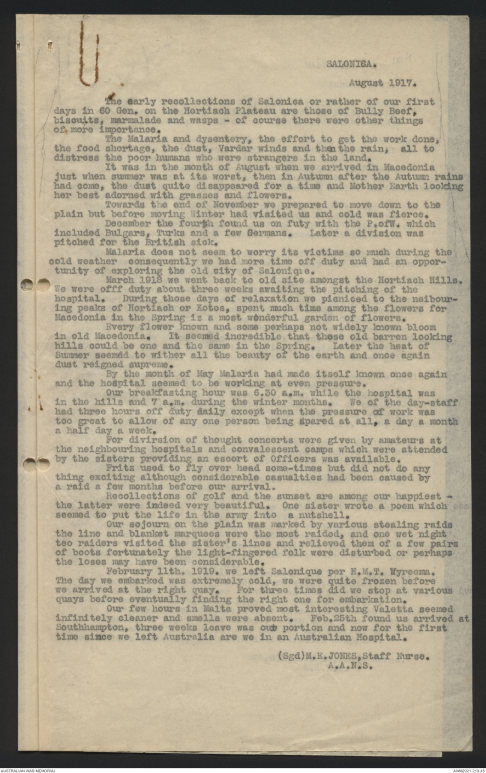
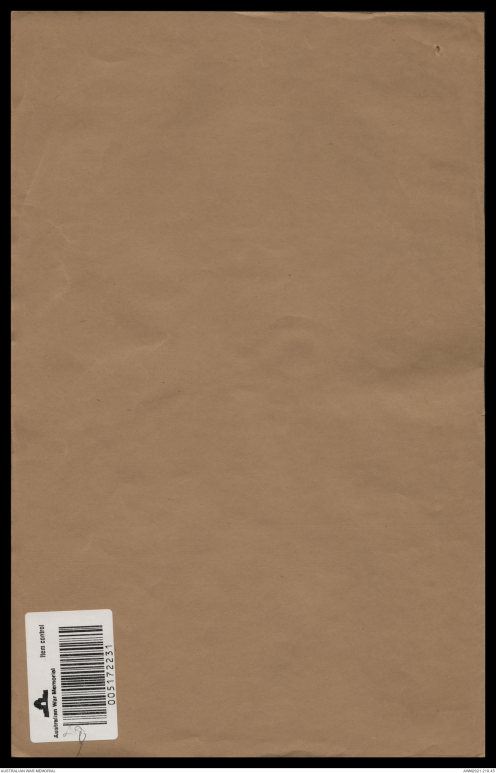
6/79
Butler Colln.
AV 41
WAR OF 1914-18
[6/20] AA
29 Aug 17
AWM 41
AUSTRALIAN ARCHIVE
ACCESS STATUS
OPEN
STAFF NURSE M.E. JONES.
A.W.M
LIBRARY
Classn No 373.2
[986]
Salonikia M. E. Jones 67/104
in 60 Gen. Hortiach Plateau
are those of bully beef, biscuits,
marmalade, wasps, the effort
to get the work done, food shortage,
the dust, Vardar winds and then
the rain.
The Official War Histories of the Commonwealth
Government (Dr C. E. W. Bean),after his study of the
collection of private war records preserved in the Australian
War Memorial Library, wrote :-
"The private diaries in this collection furnish some of the most
valuable historical records, but, like all private memoirs which were
not compiled with any historical purpose, they should not be
regarded as first-hand evidence except where it is certain that they
areas. The diarist is almost always sincere in his desire to record
accurately, but he is subject to no obligations or inducement to
indicate whether he is recording his own observations or incidents
told him by friends or heard as third or fourth hand at the mess-table.
Thus, in some of the diaries in this collection, scenes described with
detail, and without any warning that they are told at second
or third head, have been found to be completely inaccurate in
important details. A certain series also have been written up
or revived long after the events, though doubtless usually from notes
made at the time. In recent cases the student must rely on his
experiences and on informal evidence to guide him in judging what is
and what is not likely to be historically accurate".
Mr Jones
67/104
SALANONICA.
August 1917.
The early recollections of Salonica or rather of our first
days in 60 Gen. on the Hortiach Plateau are those of Bully Beef,
biscuits, marmalade and wasps - of course there were other things
of more importance.
The Malaria and dysentery, the effort to get the work done,
the food shortage, the dust, Vardar winds and then the rain, all to
distress the poor humans who were strangers in the land.
It was in the month of August when we arrived in Macedonia
just when summer was at its worst, then in Autumn after the Autumn rains
had come, the dust quite disappeared for a time and Mother Earth looking
her best adorned with grasses and flowers.
Towards the end of November we prepared to move down to the
plain but before moving Winter had visited us and cold was fierce.
December the fourth found us on futy with the P.ofW. which
included Bulgars, Turks and a few Germans. Later a division was
pitched for the British sick.
Malaria does not seem to worry its victims so much during the
cold weather consequently we had more time off duty and had an opportunity
of exploring the old city of Salonique.
March 1918 we went back to old site amongst the Hortiach Hills.
We were offf duty about three weeks awaiting the pitching of the
hospital. During those days of relaxation we picniced to the neibouring
peaks of Hortiach or Kotos, spent much time among the flowers for
Macedonia in the Spring is a most wonderful garden of flowers.
Every flower known and some perhaps not widely known bloom
in old Macedonia. It seemed incredible that those old barren looking
hills could be one and the same in the Spring. Later the heat of
Summer seemed to wither all the beauty of the earth and once again
dust reigned supreme.
By the month of May Malaria had made itself known once again
and the hospital seemed to be working at even pressure.
Our breakfasting hour was 6.30 a.m. while the hospital was
in the hills and 7 a.m. during the winter months. We of the day-staff
had three hours off duty daily except when the pressure of work was
too great to allow of any one person being spared at all, a day a month
a half day a week.
For divirsion of thought concerts were given by amateurs at
the neighbouring hospitals and convalescent camps which were attended
by the sisters providing an escort of Officers was available.
Fritz used to fly over head some-times but did not do any
thing exciting although considerable casualties had been caused by
a raid a few months before our arrival.
Recollections of golf and the sunset are among our happiest -
the latter were indeed very beautiful. One sister wrote a poem which
seemed to put the life in the army into a nutshell.
Our sojourn on the plain was marked by various stealing raids
the line and blanket marquees were the most raided, and one wet night
tso raiders visited the sister's lines and relieved them of a few pairs
of boots fortunately the light-fingered folk were disturbed or perhaps
the loses may have been considerable.
February 11th. 1919. we left Salonique per H.M.T. Wyreema.
The day we embarked was extremely cold, we were quite frozen before
we arrived at the right quay. For three times did we stop at various
quays before eventually finding the right one for embarkation.
Our few hours in Malta proved most interesting Valetta seemed
infinitely cleaner and smells were absent. Feb.25th found us arrived at
Southhampton, three weeks leave was our portion and now for the first
time since we left Australia are we in an Australian Hospital.
(Sgd)M.E.JONES, Staff Nurse.
A.A.N.S.
Spare Copies
SALONICA.
August 1917.
The early recollections of Salonica or rather of our first
days in 60 Gen. on the Hortiach Plateau are those of Bully Beef,
biscuits, marmalade and wasps - of course there were other things
of more importance.
The Malaria and dysentery, the effort to get the work done,
the food shortage, the dust, Vardar winds and then the rain, all to
distress the poor humans who were strangers in the land.
It was in the month of August when we arrived in Macedonia
just when summer was at its worst, then in Autumn after the Autumn rains
had come, the dust quite disappeared for a time and Mother Earth looking
her best adorned with grasses and flowers.
Towards the end of November we prepared to move down to the
plain but before moving Winter had visited us and cold was fierce.
December the fourth found us on futy with the P.ofW. which
included Bulgars, Turks and a few Germans. Later a division was
pitched for the British sick.
Malaria does not seem to worry its victims so much during the
cold weather consequently we had more time off duty and had an opportunity
of exploring the old city of Salonique.
March 1918 we went back to old site amongst the Hortiach Hills.
We were offf duty about three weeks awaiting the pitching of the
hospital. During those days of relaxation we picniced to the neibouring
peaks of Hortiach or Kotos, spend much time among the flowers for
Macedonia in the Spring is a most wonderful garden of flowers.
Every flower known and some perhaps not widely known bloom
in old Macedonia. It seemed incredible that those old barren looking
hills could be one and the same in the Spring. Later the heat of
Summer seemed to wither all the beauty of the earth and once again
dust reigned supreme.
By the month of May Malaria had made itself known once again
and the hospital seemed to be working at even pressure.
Our breakfasting hour was 6.30 a.m. while the hospital was
in the fills and 7 a.m. during the winter months. We of the day-staff
had three hours off duty daily except when the pressure of work was
too great to allow of any one person being spared at all, a day a month
a half a day a week.
For divirsion of thought concerts were given by amateurs at
the neighbouring hospitals and convalescent camps which were attended
by the sisters providing an escort of Officers was available.
Fritz used to fly over head some-times but did not do any
thing exciting although considerable casualties had been caused by
a raid a few months before our arrival.
Recollections of golf and the sunset are among our happiest -
the latter were indeed very beautiful. One sister wrote a poem which
seemed to put the life in the army into a nutshell.
Our sojourn on the plain was marked by various stealing raids
the line and blanket marquees were the most raided, and one wet night
tso raiders visited the sister's lines and relieved them of a few pairs
of boots fortunately the light-fingered folk were disturbed or perhaps
the loses may have been considerable.
February 11th. 1919. we left Salonique per H.M.T. Wyreema.
The day we embarked was extremely cold, we were quite frozen before
we arrived at the right quay. For three times did we stop at various
quays before eventually finding the right one for embarkation.
Our few hours in Malta proved most interesting Valetta seemed
infinitely cleaner and smells were absent. Feb.25th found us arrived at
Southhampton, three weeks leave was our portion and now for the first
time since we left Australia are we in an Australian Hospital.
(Sgd)M.E.JONES, Staff Nurse.
A.A.N.S.
SALONICA.
August 1917.
The early recollections of Salonica or rather of our first
days in 60 Gen. on the Hortiach Plateau are those of Bully Beef,
biscuits, marmalade and wasps - of course there were other things
of more importance.
The Malaria and dysentery, the effort to get the work done,
the food shortage, the dust, Vardar winds and then the rain, all to
distress the poor humans who were strangers in the land.
It was in the month of August when we arrived in Macedonia
just when summer was at its worst, then in Autumn after the Autumn rains
had come, the dust quite disappeared for a time and Mother Earth looking
her best adorned with grasses and flowers.
Towards the end of November we prepared to move down to the
plain but before moving Winter had visited us and cold was fierce.
December the fourth found us on futy with the P.ofW. which
included Bulgars, Turks and a few Germans. Later a division was
pitched for the British sick.
Malaria does not seem to worry its victims so much during the
cold weather consequently we had more time off duty and had an opportunity
of exploring the old city of Salonique.
March 1918 we went back to old site amongst the Hortiach Hills.
We were offf duty about three weeks awaiting the pitching of the
hospital. During those days of relaxation we picniced to the neibouring
peaks of Hortiach or Kotos, spend much time among the flowers for
Macedonia in the Spring is a most wonderful garden of flowers.
Every flower known and some perhaps not widely known bloom
in old Macedonia. It seemed incredible that those old barren looking
hills could be one and the same in the Spring. Later the heat of
Summer seemed to wither all the beauty of the earth and once again
dust reigned supreme.
By the month of May Malaria had made itself known once again
and the hospital seemed to be working at even pressure.
Our breakfasting hour was 6.30 a.m. while the hospital was
in the fills and 7 a.m. during the winter months. We of the day-staff
had three hours off duty daily except when the pressure of work was
too great to allow of any one person being spared at all, a day a month
a half a day a week.
For divirsion of thought concerts were given by amateurs at
the neighbouring hospitals and convalescent camps which were attended
by the sisters providing an escort of Officers was available.
Fritz used to fly over head some-times but did not do any
thing exciting although considerable casualties had been caused by
a raid a few months before our arrival.
Recollections of golf and the sunset are among our happiest -
the latter were indeed very beautiful. One sister wrote a poem which
seemed to put the life in the army into a nutshell.
Our sojourn on the plain was marked by various stealing raids
the line and blanket marquees were the most raided, and one wet night
tso raiders visited the sister's lines and relieved them of a few pairs
of boots fortunately the light-fingered folk were disturbed or perhaps
the loses may have been considerable.
February 11th. 1919. we left Salonique per H.M.T. Wyreema.
The day we embarked was extremely cold, we were quite frozen before
we arrived at the right quay. For three times did we stop at various
quays before eventually finding the right one for embarkation.
Our few hours in Malta proved most interesting Valetta seemed
infinitely cleaner and smells were absent. Feb.25th found us arrived at
Southhampton, three weeks leave was our portion and now for the first
time since we left Australia are we in an Australian Hospital.
(Sgd)M.E.JONES, Staff Nurse.
A.A.N.S.
[[Item Control?]]
Australian War Memorial
005172231
 Sam scott
Sam scottThis transcription item is now locked to you for editing. To release the lock either Save your changes or Cancel.
This lock will be automatically released after 60 minutes of inactivity.